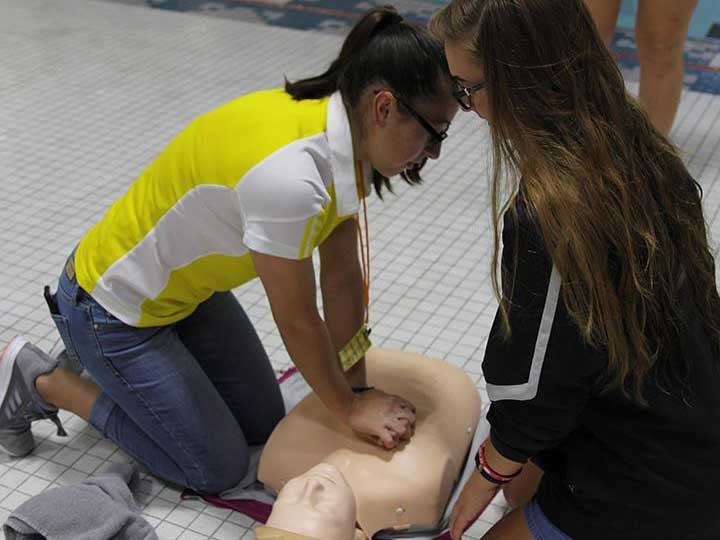Tuesday, September 5, 2017 Role play scenarios prepare recreation staff for emergencies

Cardiac emergencies, unconscious swimmers, fire evacuations, bloody injuries, and fighting players are all possible situations when more than 21,000 people walk through the doors of Campus Recreation’s indoor facilities each week. To provide the best service and troubleshoot potential problems, the department strategically trains students and professionals to handle emergencies as a team.
Training begins with an annual online risk management training via Canvas. Content includes job specific information, safety protocols to ensure the building remains safe, Blood Borne Pathogen training for injury prevention and care employees and lifeguards, and varying levels of CPR/AED and first aid training for student staff.
To increase skills through experiential learning, the department hosts an intensive hands-on emergency and life-savings scenarios training at the start of each academic year. The trainings held August 26 and 27 at Campus Recreation and the Recreation and Wellness Center had 266 student and professional staff participating in 24 different real-life examples, including:
- water rescue of an unconscious swimmer
- knee injury at an intramural game
- muscle injuries in the strength training room
- a missing child
- seizures
- skin burns in the kitchen
- vomiting and bloody patrons in the gymnasiums
- cardiac arrest in the sauna
- allergic reactions
- fire evacuations, active shooters, and severe weather drills
After each scenario was complete, participants debriefed on what they got correct, how they could improve for an actual emergency, and how they felt during and after the emergency. The fire evacuation is always an eye-opener for student employees, as they realize the number of rooms and areas people may be trapped, how many exits are available and that the main entrance may not always be the best exit in an emergency.
“Emergency scenarios prepared me for real life situations and how I should be responding. It was also great to work with all my co-workers,” said Macee Harris, a junior nutrition and health sciences major and a student facility manager at the Recreation and Wellness Center on East Campus. “Although it is tough to get up early on the weekend to do the training, it is very beneficial. It builds our confidence and assertiveness in our roles. It also teaches us to be calm when a real emergency takes place because we practiced it before it happens.”
For additional details on the training and student reactions, contact Injury Prevention and Care Coordinator Jen Krueger 402-472-4768.